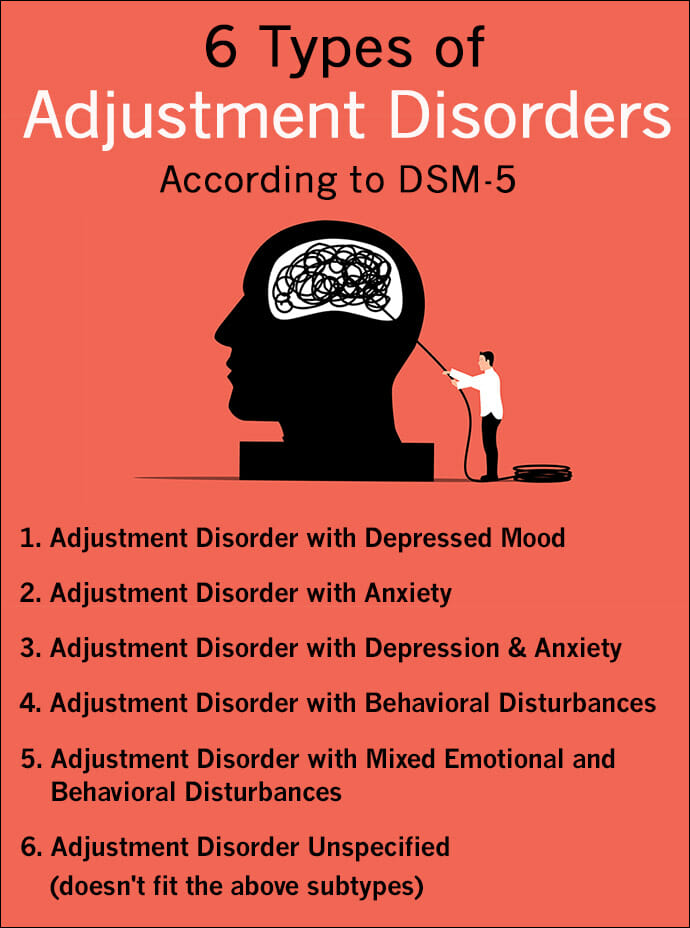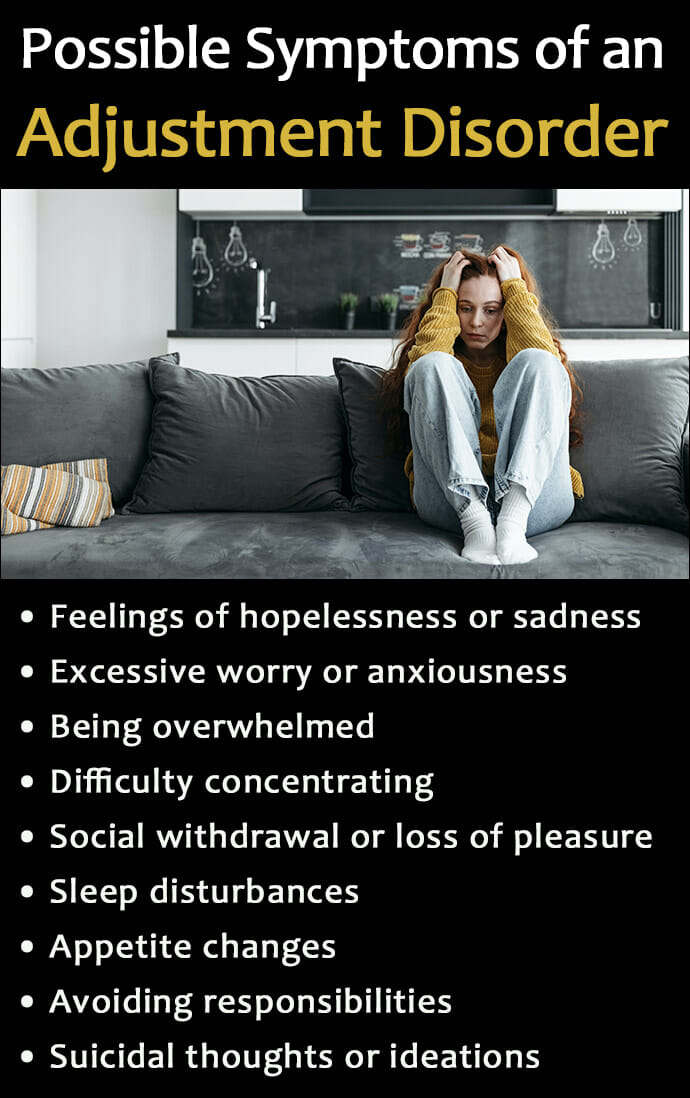An Adjustment Disorder is sometimes known as “stress response syndrome” and also “situational depression” because it is related to stress and shares some of the symptoms of depression.
Life is full of stressful, reality changing events. When these moments occur, it is often difficult for a person to envision their life moving forward in a healthy or positive direction.
It is then completely understandable that a person’s emotional and mental wellbeing can plummet in the face of these challenges and lead to stress response syndrome.
Whether a person experiences anxiety, depression, or behavioral changes like alcohol or drug abuse, battling an adjustment disorder can cause significant problems in a person’s day-to-life.
It’s also important to know that there’s absolutely no shame in experiencing problems after a life changing or stress-inducing event, and that adjustment disorders are entirely treatable.
What is an Adjustment Disorder?
Considered a stress-related condition, an adjustment disorder is an emotional or behavioral response to a stressful event or a change in a person’s life. The responses to these events are typically seen as excessive or unhealthy.
Children and adolescents are particularly vulnerable to an adjustment disorder because in many cases they’re not developed enough to mentally and emotionally process a sudden life change effectively.
Adults may also experience similar issues after life-changing events, such as trauma, the loss of a loved one, losing a job or dealing with something like a chronic disease.
Understanding the different subtypes of adjustment disorders can help people recognize the condition, in either themselves or others, and persuade them to reach out for help.
6 Types of Adjustment Disorders According to the DSM
The Diagnostic and Statistical Manual of Mental Disorders (DSM 5), considered the bible of psychiatric diagnoses, identifies six types of adjustment disorders that are each based on the primary symptom a person is experiencing.
Here are 6 Types of Adjustment Disorders (DSM-5)
- Adjustment Disorder with Depressed Mood
- Adjustment Disorder with Anxiety
- Adjustment Disorder with Depression and Anxiety
- Adjustment Disorder with Behavioral Disturbances
- Adjustment Disorder with Mixed Emotional and Behavioral Disturbances
- Adjustment Disorder Unspecified – for cases that might not fit the above subtypes
There are any number of reasons why people develop this condition. What might seem stressful and life changing to one person can seem completely normal to another, which is sometimes why people are afraid to admit that they’re struggling with change or stress.
Possible Causes of Adjustment Disorder
Every person is uniquely different and each individual will vary in experiences, vulnerability, coping skills, and temperament.
Because people are never in the same phase of development, their ability to deal with a specific life stressor is not always equal to the same capability of others. That is not something to feel any embarrassment or shame about, though.
Since all people are entirely different, there is not one single factor that causes an adjustment disorder.
In addition, a person’s background can make them more vulnerable to the condition.
For example, people who had a traumatic or stressful childhood may be more likely to experience stress response syndrome, as well as those who struggle with other mental health problems, or are dealing with several stressful events at one time.
Some Possible Causes of Adjustment Disorder can occur from the following:
- Life threatening events, such as physical or sexual assault, witnessing violence, dealing with a disaster, or displacement by war
- Dealing with divorce, marital problems, or other relationship issues
- Major life changes, such as coming down with a serious disease, having a child, going away to school or retirement
- Negative events, like financial struggles, the loss of a loved one, or sudden unemployment
- Environmental problems, such living in dangerous neighborhood, living with someone who is chronically ill, or dealing with a rough work or school environment
All of these issues can be extremely stressful and lead to a spectrum of symptoms in people attempting to cope with them.
While some of the causes of an adjustment disorder may seem very similar to those of PTSD, they are considered different conditions based on the timing and duration of symptoms.
Adjustment Disorder Symptoms
The symptoms of an adjustment disorder will vary from person to person, though a primary indicator is experiencing more stress than would normally be expected in response to an event, leading to serious life issues.
Symptoms of an Adjustment Disorder can include some of the following:
- Feelings of hopelessness, frequent crying, and sadness
- Excessive worry, anxiousness, feeling nervous and jittery
- A sense of being overwhelmed, difficulty concentrating, or making decisions
- Social withdrawal, as well as a loss of pleasure in activities and people once cherished
- Sleep disturbances, like sleeping too much or being unable to sleep
- Appetite changes, eating too much or too little
- Avoiding responsibilities, such as going to work, paying bills, or meeting other commitments
- Suicidal thoughts or ideations
Another symptom of an adjustment disorder can include a spike in drug or alcohol use as a way to self-medicate difficult emotions.
This may be particularly serious because this behavioral change can lead to a substance use disorder, which will only worsen the co-occurring symptoms.
Adjustment Disorder Treatment
Gritting your teeth and living with an adjustment disorder is entirely unnecessary because there are effective treatment methods for the condition.
In many cases, simply seeing a counselor and discussing the causes and symptoms can provide a better perspective and relief from symptoms.
In other cases, treatment approaches that combine cognitive behavioral therapy (CBT), which helps people identify and alter negative or inaccurate thinking, can be incredibly effective.
Antidepressant or anti-anxiety medications can be helpful for some people, especially when combined with behavioral or talk therapy.
Group and family therapy sessions might be appropriate and will help a person realize that they’re not alone in experiencing stress related to a life-changing event.
Practicing good lifestyle habits, such as eating healthy foods, exercising, and maintaining a proper amount of restful sleep have proven to reduce stress, anxiety, and depression.
Finally, for those struggling with a combined substance use disorder and an adjustment disorder together, dual diagnosis treatment for both conditions may be necessary for a healthy recovery.
Without dual diagnosis treatment, there is a greater likelihood that one or both conditions may return.
Treating an adjustment disorder and finding relief as soon as possible will minimize the chances that it develops into something more serious like a major depressive disorder.






